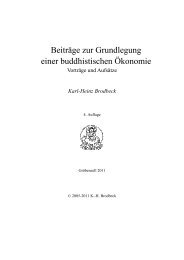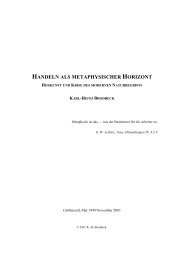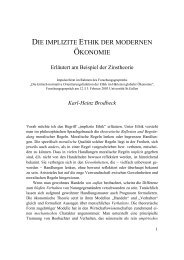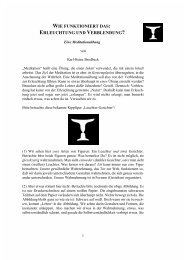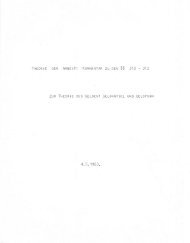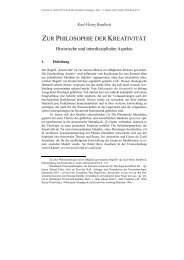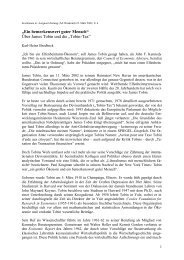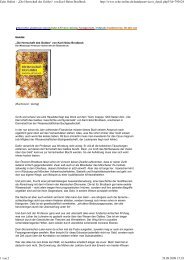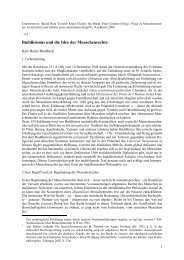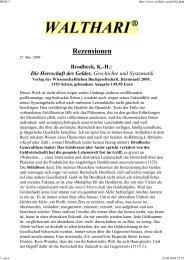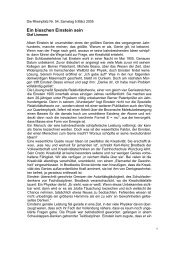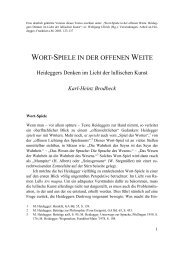Money: The global power of an illusion - Karl-Heinz Brodbeck
Money: The global power of an illusion - Karl-Heinz Brodbeck
Money: The global power of an illusion - Karl-Heinz Brodbeck
You also want an ePaper? Increase the reach of your titles
YUMPU automatically turns print PDFs into web optimized ePapers that Google loves.
<strong>Money</strong>: <strong>The</strong> <strong>global</strong> <strong>power</strong> <strong>of</strong> <strong>an</strong> <strong>illusion</strong><br />
A Buddhist perspective 1<br />
(draft version – will be published in 2010)<br />
<strong>Karl</strong>-<strong>Heinz</strong> <strong>Brodbeck</strong><br />
In Buddhist ethics, priority is given to the qualities <strong>of</strong> non-violence <strong>an</strong>d compassion: “All<br />
those who suffer in the world do so because <strong>of</strong> their desire for their own happiness. All those<br />
happy in the world are so because <strong>of</strong> their desire for the happiness <strong>of</strong> others.“ 2 In this, it directly<br />
opposes the prevailing economic ideology, whose central idea was expressed by Adam<br />
Smith as follows: “It is not from the benevolence <strong>of</strong> the butcher, the brewer, or the baker, that<br />
we expect our dinner, but from their regard to their own interest. We address ourselves, not to<br />
their hum<strong>an</strong>ity but to their self-love” 3 . <strong>The</strong> Buddhist critique <strong>of</strong> egoism, however, is not derived<br />
from a moral norm, but from the insight that wrong thought causes suffering. In so far as<br />
Buddhism deals with deluded forms <strong>of</strong> thought, it is a critical philosophy. Buddha is described<br />
as teaching “with differentiation, he does not teach here in a one-sided way“ 4 . Consequently,<br />
the Buddhist teaching is described as “the discriminative, differentiating, <strong>an</strong>alytical<br />
or critical teaching“ (vibhajjavāda). 5 “Criticism is the very essence <strong>of</strong> Buddha’s teaching“ 6 .<br />
„Buddhism is criticism” 7 .<br />
We c<strong>an</strong> apply this teaching to some <strong>of</strong> the recent literature that focuses on consumerism, ecological<br />
problems, women’s <strong>an</strong>d children’s rights, general questions <strong>of</strong> justice, etc, under the<br />
rubric <strong>of</strong> economics. 8 <strong>The</strong> critical potential <strong>of</strong>fered by Buddhist tradition, <strong>an</strong>d most <strong>of</strong> all by<br />
the Madhyamaka philosophy, has not been much in evidence in these discussions. Yet, it is<br />
the central subject <strong>of</strong> Madhyamaka philosophy to show the imm<strong>an</strong>ent untenability <strong>of</strong> existing<br />
forms <strong>of</strong> thought – not from a perspective <strong>of</strong> nihilism, <strong>of</strong> which Nagarjuna has <strong>of</strong>ten been accused,<br />
but from the realization that erroneous thought is the cause <strong>of</strong> all suffering <strong>an</strong>d <strong>an</strong> obstacle<br />
on the way to liberation. Even so, the attempt to sustain a systematic <strong>an</strong>d pertinent critique<br />
<strong>of</strong> modern economic science, <strong>an</strong>d especially <strong>of</strong> the theory <strong>of</strong> money, performed in the<br />
tradition <strong>of</strong> Nal<strong>an</strong>da, say, has been very limited up to the present day. 9 In the following I will<br />
draft the outline <strong>of</strong> how such a critique could be formulated. For this, I will need to sketch out<br />
some <strong>of</strong> the fundamental concepts <strong>of</strong> Buddhist psychology <strong>an</strong>d <strong>of</strong> Madhyamaka logic in order<br />
to develop them so that they c<strong>an</strong> be applied to the problems <strong>of</strong> the theory <strong>of</strong> money <strong>an</strong>d, by<br />
extension, to the reality perceived in <strong>global</strong> capitalism. Some considerations about the responsibility<br />
<strong>of</strong> Engaged Buddhism will conclude this essay.<br />
<strong>The</strong> three poisons<br />
According to the Buddhist idea, hum<strong>an</strong> action is governed by a defiled motivation. <strong>The</strong>se defilements<br />
may be subsumed in the concept <strong>of</strong> the three poisons: greed, hatred, <strong>an</strong>d delusion<br />
1<br />
Tr<strong>an</strong>slated from Germ<strong>an</strong> by Ilse Maria Bruckner <strong>an</strong>d Roger Gathm<strong>an</strong>.<br />
2 S<strong>an</strong>tideva 1996, 99.<br />
3 Smith 1976, 26f.<br />
4 Anguttara-Nikāya X, 94 (= PTS, Vol. V, 190). Tr<strong>an</strong>sl. by Nyānaponika <strong>The</strong>ra <strong>an</strong>d Bhikkhu Bodhi.<br />
5 Nyānatiloka / Nyānaponika. 1984, Vol. 5, 133, note 119 (commentary on the quotation above)<br />
6 Murti 1980, 8.<br />
7 Hakamaya 1997, 56.<br />
8 Schumacher 1965; Payutto 1994; Harvey 2000.<br />
9 Alex<strong>an</strong>drin 1993; Loy 1991; <strong>Brodbeck</strong> 2001, 2002, 2006.<br />
1
(Pali: lobha, dosa, avijja). <strong>The</strong>se three poisons constitute the process wherein the ego constructs<br />
its domain to defend the <strong>illusion</strong> <strong>of</strong> the thought <strong>of</strong> “I”. In fact, the hum<strong>an</strong> personality is<br />
interlinked in various ways with other hum<strong>an</strong> <strong>an</strong>d living beings, with nature <strong>an</strong>d with mental<br />
phenomena. In this interdependency, <strong>an</strong> independent “acting hum<strong>an</strong> entity“ is illusory. It is<br />
generated through the grasping <strong>of</strong> tr<strong>an</strong>sient objects (greed) <strong>an</strong>d the defending <strong>of</strong> the objects<br />
grasped (hatred) on the basis <strong>of</strong> <strong>an</strong> illusory idea <strong>of</strong> the self (delusion).<br />
In Buddhist practice, we come to realize the illusoriness <strong>of</strong> this process. Two core methods to<br />
achieve this c<strong>an</strong> be identified: firstly, the careful <strong>an</strong>alysis <strong>of</strong> conscious processes, which are<br />
permeated with illusory thoughts; <strong>an</strong>d secondly, the development <strong>of</strong> compassion as a remedy<br />
against the three poisons. <strong>The</strong> practice <strong>of</strong> compassion is not a superficial moral rule here, but<br />
instead is based on the insight into that state <strong>of</strong> interdependence <strong>an</strong>d, at the same time, into the<br />
emptiness <strong>of</strong> all phenomena, which have no imm<strong>an</strong>ent subst<strong>an</strong>ce, no ego, <strong>an</strong>d no nature <strong>of</strong> self<br />
(svabhāva). Consequently, the practice <strong>of</strong> compassion is nothing but the highest form <strong>of</strong> Buddhist<br />
knowledge, that insight into the emptiness (śūnyāta) <strong>of</strong> all phenomena which is tr<strong>an</strong>sformed<br />
into action. This me<strong>an</strong>s that, in Buddhism, ethics c<strong>an</strong>not be separated from epistemology.<br />
Instead, compassionate ethical action is a way <strong>of</strong> embedding a cognitive practice in one’s everyday<br />
environment, based on the realization <strong>of</strong> the interdependence <strong>of</strong> all phenomena, whose<br />
emptiness, in turn, serves to subst<strong>an</strong>tiate <strong>an</strong>d justify ethical action. That is why there is no<br />
“value-neutral“ theory <strong>of</strong> hum<strong>an</strong> action. Each <strong>an</strong>d every cognition <strong>of</strong> social processes hides a<br />
moral judgment, <strong>an</strong>d so every theory that appears to be “value-neutral“ is, in truth, <strong>an</strong> implicit<br />
ethics.<br />
Indeed, the core diagnosis in the Buddha’s teaching is that all frustration <strong>an</strong>d all suffering are<br />
rooted in knowledge that has been diverted from its object. Nevertheless, in everyday reality<br />
the truth about this repressed knowledge <strong>of</strong> the concept <strong>of</strong> a subst<strong>an</strong>tial “I“, becomes apparent:<br />
it is <strong>an</strong> <strong>illusion</strong> that c<strong>an</strong>not withst<strong>an</strong>d the test <strong>of</strong> experience. In the end it is wrong thinking<br />
that is responsible for the suffering in the world. <strong>The</strong> public sphere <strong>of</strong> communication is<br />
contaminated by concepts that are proven to be delusions by the fact that, by holding on to<br />
them, people expose themselves again <strong>an</strong>d again to the most varied forms <strong>of</strong> undesirable<br />
situations.<br />
So we don’t have the simple option <strong>of</strong> drawing a moral doctrine from the spirit <strong>of</strong> Buddha’s<br />
teaching to place it alongside economic practice in order to tame the economy. <strong>The</strong> nature <strong>of</strong><br />
social <strong>an</strong>d economic actions is created by forms <strong>of</strong> thought <strong>an</strong>d as a result <strong>of</strong> a motivation<br />
which all prove to be illusory. Economic practice will always be shaped <strong>an</strong>d governed by<br />
forms <strong>of</strong> thought which have suffering as their consequence, unless it takes the mutual interdependency<br />
<strong>of</strong> all social <strong>an</strong>d natural phenomena as its foundation.<br />
Madhyamaka Logic<br />
Admittedly, so far this general diagnosis remains a mere assertion unless we systematically<br />
<strong>an</strong>d rationally explain it on the basis <strong>of</strong> its subject: economics. Thus, in the present text, I will<br />
select one central subject ― namely money <strong>an</strong>d connected phenomena ― to test validity <strong>of</strong><br />
the Buddhist critique. To do so, I will discuss those forms <strong>of</strong> thought where the science <strong>of</strong><br />
economics describes money <strong>an</strong>d the markets. If Buddhist <strong>an</strong>alysis is factually veridical, <strong>an</strong><br />
assumption that has never been doubted by the tradition, we ought to see this work out in<br />
practice. For this, subst<strong>an</strong>tial support is provided by Buddhist logic <strong>an</strong>d Madhyamaka’s critique<br />
<strong>of</strong> knowledge.<br />
2
Madhyamaka logic is peculiar in that it is, at the same time, <strong>an</strong> ontological critique. Ontology<br />
is about the definition <strong>of</strong> being: what is the me<strong>an</strong>ing <strong>of</strong> words like “really“ or “it is“? <strong>The</strong><br />
general critique <strong>of</strong> Madhyamaka philosophy is that this ontological definition gives us <strong>an</strong> <strong>illusion</strong><br />
<strong>of</strong> “being a self“ (svabhāva): in everyday life, objects are interpreted in such a way as if<br />
they had a cause, a being, a core or a mainstay in themselves. In this context, Madhyamaka<br />
dialectics has the demystifying function <strong>of</strong> demonstrating that this implicit assumption about<br />
the nature <strong>of</strong> objects is <strong>an</strong> <strong>illusion</strong>. <strong>The</strong> Madhyamaka critique operates to uncover this <strong>illusion</strong><br />
in all <strong>of</strong> its various m<strong>an</strong>ifestations.<br />
<strong>The</strong> specific logic <strong>of</strong> this form <strong>of</strong> thought, however, has been heatedly discussed by the different<br />
Buddhist schools already. Yet, it would go beyond the scope <strong>of</strong> this essay to consider in<br />
<strong>an</strong>y detail the special features <strong>an</strong>d different opinions brought into play by Indi<strong>an</strong> 10 , Tibet<strong>an</strong> 11 ,<br />
Chinese 12 <strong>an</strong>d recently also Jap<strong>an</strong>ese 13 Buddhism.<br />
A safe approach that will help us avoid the detour into scholastic disputations is to prove the<br />
Madhyamaka form <strong>of</strong> thought by me<strong>an</strong>s <strong>of</strong> a special object. At the same time, the subst<strong>an</strong>tial<br />
difference between Buddhist <strong>an</strong>d traditional Europe<strong>an</strong> logic c<strong>an</strong> be demonstrated here. I will<br />
develop this more systematically about the subject <strong>of</strong> money. To do this, I will have recourse<br />
to a figure <strong>of</strong> speech that appears in Nagarjuna´s Vigrahavyavart<strong>an</strong>i. <strong>The</strong> passage runs: „Supposing<br />
somebody said: the son is to be produced by the father, <strong>an</strong>d that father is to be produced<br />
by that very son, tell me who is to be produced by whom.” 14<br />
Nagarjuna uses this example as a model for all forms <strong>of</strong> logical reasoning, where a definition<br />
(pramāna) gains its me<strong>an</strong>ing only by the defined (prameya), <strong>an</strong>d vice versa. A cause c<strong>an</strong>not<br />
be thought without <strong>an</strong> effect, a reason not without a consequence, etc. Everyday thinking is<br />
ent<strong>an</strong>gled in such circular forms <strong>of</strong> thought <strong>an</strong>d has a perm<strong>an</strong>ent tendency to reify the poles <strong>of</strong><br />
a relation (like father-son). One c<strong>an</strong>not think a father without thinking a “child“, <strong>an</strong>d vice<br />
versa.<br />
However, this is not merely about forms <strong>of</strong> thought, but also about experienced reality: <strong>The</strong><br />
delusive forms <strong>of</strong> thought are at the same time what we refer to as “reality“. If social facts are<br />
considered, <strong>an</strong>other factor becomes relev<strong>an</strong>t here: (delusive) forms <strong>of</strong> thought are what generate<br />
nothing less th<strong>an</strong> social reality, or, as Buddhist tradition would call it, the „karmic vision“.<br />
Indeed, the reason for all hum<strong>an</strong> suffering, not least in the field <strong>of</strong> economy, is that this <strong>illusion</strong>,<br />
based as it is on karmic vision, is not understood in its true nature.<br />
Economic expl<strong>an</strong>ations <strong>of</strong> money<br />
In modern capitalism, economic processes are tr<strong>an</strong>sacted through the market <strong>an</strong>d by me<strong>an</strong>s <strong>of</strong><br />
money. Here it is useful to investigate more closely how these processes are explained by different<br />
economic theories. To do so, I will proceed in the same way that the Madhyamikas<br />
demonstrate the logical fallacies <strong>of</strong> contemporary systems <strong>of</strong> thought: it is proven that the<br />
claimed positions are unthinkable <strong>an</strong>d are bound to get ent<strong>an</strong>gled in contradictions, exactly<br />
10 Ruegg 1981; Della S<strong>an</strong>tina 1986; Wood 1994.<br />
11 Hopkins 1983; Pettit 1999; Williams 2000.<br />
12 Cheng 1991; King 1991.<br />
13 Hubbard <strong>an</strong>d Sw<strong>an</strong>son 1997.<br />
14 Nagarjuna 1998, 123. Cf. „A father is not a son, a son is not a father. Neither exists except in correlation<br />
with the other. Nor are they simult<strong>an</strong>eous.” Nagarjuna. Sunyatāsapti 13. In Lindtner 1997, 99. Cf. to this<br />
circular logic: <strong>Brodbeck</strong> 2002a.<br />
3
ecause they are formulated on the untenable foundation <strong>of</strong> subst<strong>an</strong>ce metaphysics, the fiction<br />
<strong>of</strong> a self (ātm<strong>an</strong>) <strong>of</strong> persons or objects.<br />
At a first gl<strong>an</strong>ce, one might think that, as the result <strong>of</strong> this. <strong>The</strong>re is a certain closeness <strong>of</strong> Buddhism<br />
<strong>an</strong>d the economic theory prevailing today (neoclassical economics) because the latter is<br />
definitely a rational theory. It describes hum<strong>an</strong> action as the result <strong>of</strong> rational decisions.<br />
“Hum<strong>an</strong> action is purposeful behaviour.“ 15 At a first gl<strong>an</strong>ce, this underst<strong>an</strong>ding seems to correspond<br />
with the Buddhist teaching which is expressed as follows in the first sentence <strong>of</strong> the<br />
Dhammapāda: „Phenomena are preceded by the mind, ruled by the mind.“ Also in the<br />
Abhidharma, in its expl<strong>an</strong>ation <strong>of</strong> dependent origination, consciousness (vijnāna) precedes the<br />
m<strong>an</strong>ifested action in different situations. 16 But this superficial similarity does not smooth<br />
away the fundamental differences. According to Buddhist underst<strong>an</strong>ding, thinking <strong>an</strong>d consciousness<br />
are always conditioned, but not in terms <strong>of</strong> <strong>an</strong> entity existing in itself as claimed by<br />
economists, who in this are the heirs <strong>of</strong> Cartesi<strong>an</strong> philosophy. <strong>The</strong> latter define action as individual,<br />
as the causal activity <strong>of</strong> <strong>an</strong> Ego: “It is beyond doubt that the practice <strong>of</strong> considering<br />
fellow men as beings who think <strong>an</strong>d act as I, the Ego, do has turned out well; [..] “ 17<br />
Accordingly, the Ego, the entity <strong>of</strong> the acting hum<strong>an</strong>, is presupposed as <strong>an</strong> axiom. This entity<br />
corresponds to the liberal fiction that society has come into existence by a social contract, in<br />
which rational, but also egoist individuals agree on a property order to the adv<strong>an</strong>tage <strong>of</strong> all<br />
parties. This contract theory has been much criticized; I mention this only because it corresponds<br />
to a concept which, in theory <strong>of</strong> economy, Schumpeter calls “methodological individualism”<br />
18 . <strong>The</strong> starting point <strong>of</strong> the <strong>an</strong>alysis in modern economics is <strong>an</strong> entity (consumer,<br />
firm) that makes decisions independently <strong>of</strong> all others. Contact among people only exists in<br />
the form <strong>of</strong> exch<strong>an</strong>ge. Markets create society by way <strong>of</strong> exch<strong>an</strong>ge processes. According to a<br />
well-known simile, money serves only as a sort <strong>of</strong> lubric<strong>an</strong>t: money “is none <strong>of</strong> the wheels <strong>of</strong><br />
trade: It is the oil which renders the motion <strong>of</strong> the wheels more smooth <strong>an</strong>d easy.” 19 Exch<strong>an</strong>ge<br />
becomes necessary by the division <strong>of</strong> labor which is axiomatically introduced as a precondition.<br />
Another thesis claims that money is only <strong>an</strong> indicator <strong>of</strong> the exch<strong>an</strong>ge value <strong>of</strong> goods.<br />
Exch<strong>an</strong>ge value itself is interpreted differently by various schools. Originally, gold was attributed<br />
a perm<strong>an</strong>ent intrinsic value that was intended to express the value <strong>of</strong> goods.<br />
As the discussion <strong>of</strong> economics developed, however, it became apparent that these original<br />
premises couldn’t be maintained. On one h<strong>an</strong>d, the gold st<strong>an</strong>dard has long been gone; on the<br />
other h<strong>an</strong>d, the value <strong>of</strong> gold obviously depends on the amount available, as for inst<strong>an</strong>ce its<br />
decline in price after the discovery <strong>of</strong> the gold sources in South America in the 15th <strong>an</strong>d 16th<br />
centuries, which resulted in a general inflation. Presently, the more ambitious approaches explain<br />
money essentially by two more theories: (1) by the thesis that money is only a (special)<br />
commodity which was generated by <strong>an</strong> evolutionary process from isolated barter to general<br />
exch<strong>an</strong>ge. Accordingly, real money must always derive its value from some metal (metalism).<br />
(2) From <strong>an</strong> alternative perspective, money is regarded as <strong>an</strong> indicator st<strong>an</strong>dardised by the<br />
state (nominalism).<br />
15 Mises 1966, 11.<br />
16 Of the twelve factors <strong>of</strong> dependent origination (pratityasamutpāda), vijnāna (consciousness) is the third<br />
factor, followed by nama-rupa, existence in a body, that forms the basis <strong>of</strong> all kinds <strong>of</strong> experience <strong>an</strong>d action<br />
connected with it.<br />
17 Mises 1966, 24. <strong>The</strong> Germ<strong>an</strong> wording <strong>of</strong> the original text differs somewhat: “Das Ich ist die Einheit des<br />
h<strong>an</strong>delnden Menschen. Es ist fraglos gegeben und k<strong>an</strong>n durch kein Denken aufgelöst werden.” Mises, 1940,<br />
34.<br />
18 Schumpeter 1908, 88: “methodologischer Individualismus”.<br />
19 Hume 1826, 317.<br />
4
<strong>The</strong> first one <strong>of</strong> these theses, developed by Carl Menger, is a mere exch<strong>an</strong>ge theory. Here, the<br />
argument is as follows: the division <strong>of</strong> labour is at the same time a division <strong>of</strong> needs. Everyone<br />
has m<strong>an</strong>y needs, but produces only a few products, in contrast to peas<strong>an</strong>t cultures that<br />
were, essentially, self-supporting. Consequently, everyone has to barter his products against<br />
other products that satisfy his needs. Here, however, <strong>an</strong> insurmountable problem exists: Whoever<br />
has grown a certain sort <strong>of</strong> vegetables <strong>an</strong>d is in need <strong>of</strong> shoes will have to find a bartering<br />
partner who, symmetrically, has produced shoes <strong>an</strong>d needs exactly this sort <strong>of</strong> vegetables. For<br />
m<strong>an</strong>y products, the probability that this will coincide is close to zero. Yet, Menger solves this<br />
problem by the following consideration: by <strong>an</strong>d by, people discovered that barter could also<br />
be made indirectly <strong>an</strong>d so become a general exch<strong>an</strong>ge economy. At first, a vegetable is bartered<br />
against salt, for example, which in comparison is a widely needed good, <strong>an</strong>d then barters<br />
this salt against shoes. Carl Menger recognises the incentive for this in the egoism <strong>of</strong> the economic<br />
m<strong>an</strong>: by indirect exch<strong>an</strong>ge, a speculative exch<strong>an</strong>ge pr<strong>of</strong>it c<strong>an</strong> be gained in addition,<br />
namely by the “exploitation <strong>of</strong> existing opportunities <strong>of</strong> exch<strong>an</strong>ge” 20 . Motivated in this way<br />
egoism, stirred up by the “difficulties <strong>of</strong> exch<strong>an</strong>ge“, automatically produces goods that are<br />
exch<strong>an</strong>ged in the evolving process <strong>of</strong> trade; <strong>an</strong>d finally, a special good is left: money.<br />
This expl<strong>an</strong>ation <strong>of</strong> money has been varied several times, even in the form <strong>of</strong> computer simulations<br />
in virtual societies, consisting <strong>of</strong> rational egoists competing with each other. But none<br />
<strong>of</strong> these expl<strong>an</strong>ations c<strong>an</strong> be reconstructed rationally. <strong>The</strong>y fail by their own preconditions:<br />
the “difficulties <strong>of</strong> exch<strong>an</strong>ge“ c<strong>an</strong> only emerge <strong>an</strong>d be solved “in <strong>an</strong> evolutionary process“,<br />
<strong>an</strong>d “opportunities <strong>of</strong> exch<strong>an</strong>ge“ c<strong>an</strong> only develop if the thing, “exch<strong>an</strong>ge society“, is already<br />
a precondition. But, according to Menger’s own statement, this exch<strong>an</strong>ge society is not at all<br />
able to exist without <strong>an</strong>y money, exactly because <strong>of</strong> the insurmountable difficulties <strong>of</strong> finding<br />
bartering partners. This brings up the question <strong>of</strong> how, in a thing called “exch<strong>an</strong>ge society”,<br />
there could possibly develop a process that would generate money first if, without <strong>an</strong>y money,<br />
such <strong>an</strong> exch<strong>an</strong>ge society c<strong>an</strong>not exist. Obviously, this argument runs into a vicious circle. 21<br />
A second group <strong>of</strong> theories was developed that may be summed up in the formula <strong>of</strong> Georg<br />
Friedrich Knapp: “<strong>Money</strong> is a creation <strong>of</strong> the legal system“. 22 Here, no attempt is made to<br />
explain how money arose from barter, but the state order <strong>of</strong> exch<strong>an</strong>ge is taken as its basis. I<br />
will let the objection pass that now the expl<strong>an</strong>ation is merely shifted <strong>an</strong>d one would have to<br />
find arguments to explain how, then, states, <strong>an</strong>d in these states markets as well, have come<br />
into existence. This “nominalistic theory <strong>of</strong> money“, which is also presupposed by the wellknown<br />
economist John Maynard Keynes <strong>an</strong>d his monetary critic Milton Friedm<strong>an</strong>, seems to<br />
have solved the problem: <strong>Money</strong> is simply put into validity by <strong>an</strong> institution <strong>of</strong> the state, <strong>an</strong>d<br />
today by the central b<strong>an</strong>ks.<br />
This expl<strong>an</strong>ation does not fall in the same circle as Menger’s evolutionary expl<strong>an</strong>ation <strong>of</strong><br />
money, but it is caught up in <strong>an</strong>other. <strong>The</strong>re have always been, <strong>an</strong>d still are, stages <strong>of</strong> development<br />
<strong>an</strong>d countries where citizens refuse to use the money printed by the state because <strong>of</strong><br />
inflations or for other reasons. This money does not only lose its value, it also loses its function.<br />
In a <strong>global</strong> economy there is also the fact that money must also be measured against foreign<br />
currencies: there is no country that could decree its currency to be valid in other countries.<br />
As is shown by the deterioration <strong>of</strong> the US dollar in recent times, this c<strong>an</strong> result in a gradual<br />
undermining <strong>of</strong> the validity <strong>of</strong> money, first in foreign countries but then also at home. <strong>The</strong>re is<br />
no state that could decree the continuing validity <strong>of</strong> money. Thus the “money theory <strong>of</strong> the<br />
20 Menger 1892.<br />
21 This is also true for the naïve idea that money is <strong>an</strong> “invention“, which also presumes the very thing for<br />
which money is said to have been invented: exch<strong>an</strong>ge society. More about this problem in <strong>Brodbeck</strong> 2009a.<br />
22 Knapp 1921, 1.<br />
5
state“ falls into a vicious circle again: it presupposes something which would have to be<br />
brought about by money first, namely its general recognition.<br />
<strong>The</strong> reason for the failure <strong>of</strong> the expl<strong>an</strong>ation <strong>of</strong> money<br />
What is the logical problem here? Apparently, money is <strong>of</strong> a completely different nature th<strong>an</strong><br />
the nature presupposed by traditional theories <strong>of</strong> economy. <strong>The</strong>y proceed on the assumption <strong>of</strong><br />
<strong>an</strong> idea <strong>of</strong> subst<strong>an</strong>ce that exists in three forms: (1) An inherent money value, represented by<br />
gold, is presumed; (2) <strong>an</strong> entity “exch<strong>an</strong>ge society“, consisting <strong>of</strong> egoist individuals generating<br />
money as <strong>an</strong> evolutionary process, is presumed; (3) a state is postulated as a <strong>power</strong> which<br />
c<strong>an</strong> decree values <strong>an</strong>d control them. <strong>The</strong>se three expl<strong>an</strong>ations fail in the fact that monetary<br />
values c<strong>an</strong>not be determined as a subst<strong>an</strong>ce, nor c<strong>an</strong> they be reduced to other subst<strong>an</strong>tial entities<br />
(egoist individuals, exch<strong>an</strong>ge society, <strong>an</strong>d the state). All expl<strong>an</strong>ations <strong>of</strong> money show a<br />
peculiar circularity. <strong>Money</strong> is only recognized if it has a value; <strong>an</strong>d it only has a value if it is<br />
generally <strong>an</strong>d widely used. This me<strong>an</strong>s that money does not have <strong>an</strong>y value subst<strong>an</strong>ce. This<br />
value only appears as a tr<strong>an</strong>sitory fiction in a circular process.<br />
From here it follows that money c<strong>an</strong>not be “derived“ or “explained“ from causes because<br />
money, as a fiction, is empty. Its me<strong>an</strong>ing is its illusoriness <strong>an</strong>d ignor<strong>an</strong>ce c<strong>an</strong>not be subst<strong>an</strong>tiated.<br />
An <strong>illusion</strong> c<strong>an</strong> only be identified; then it will disappear or, at least, will lose its hold on<br />
thought <strong>an</strong>d action. To use a well-known example from the Cittamatrin school: if it is discovered<br />
that the perception <strong>of</strong> a snake was only <strong>an</strong> <strong>illusion</strong> because it was the erroneous perception<br />
<strong>of</strong> a rope, the hold <strong>of</strong> this <strong>illusion</strong> over the mind <strong>an</strong>d the fear connected with it will disappear.<br />
What is peculiar, however, about the value <strong>of</strong> money <strong>an</strong>d the hopes <strong>an</strong>d fears connected<br />
with it lies in the fact that this value is reproduced as a collective <strong>illusion</strong>. Yet, this <strong>illusion</strong><br />
still has its basis in the thought <strong>of</strong> individuals. As inflations or stock market crashes show, the<br />
<strong>illusion</strong> <strong>of</strong> monetary value c<strong>an</strong> disappear overnight: prices go down, paper money loses its<br />
value, machines or houses that have just been assets in the books suddenly lose their value in<br />
a crisis <strong>an</strong>d their values are recognized as <strong>an</strong> <strong>illusion</strong> even by everyday consciousness. This<br />
me<strong>an</strong>s that money does not even have a perm<strong>an</strong>ent value in a conventional sense. <strong>The</strong> value <strong>of</strong><br />
money is merely created by a tr<strong>an</strong>sitory trust in <strong>an</strong> <strong>illusion</strong>. We think <strong>an</strong>d calculate in terms <strong>of</strong><br />
<strong>an</strong> <strong>illusion</strong>; even in the smallest details <strong>of</strong> our everyday life we trust in <strong>an</strong> entity that, in itself,<br />
is without <strong>an</strong>y subst<strong>an</strong>ce.<br />
At this point the logical structure c<strong>an</strong> easily be recognized that was demonstrated by Nagarjuna<br />
with the father <strong>an</strong>d son example. <strong>Money</strong> c<strong>an</strong> have a value only if all the market particip<strong>an</strong>ts<br />
believe in this value. <strong>The</strong>y will, in turn, believe in it because they attribute <strong>an</strong> illusory<br />
value to money. 23 In short, money <strong>an</strong>d monetary value form a circle <strong>of</strong> delusion. To <strong>an</strong> entity<br />
we have ascribed a self-nature, when it does not really have one; rather, it is created in a process<br />
<strong>of</strong> delusion.<br />
And how does this actually happen in practice? It is brought about simply by the fact that we<br />
accept money in exch<strong>an</strong>ge for perform<strong>an</strong>ces or products (which me<strong>an</strong>s that we believe in its<br />
value) <strong>an</strong>d take its unit as a basis for our calculations. This cognitive calculus points to the<br />
fact that money is based on a mental process or, in other words, on a delusion <strong>of</strong> thought. We<br />
h<strong>an</strong>dle our relationships with other people by calculating their perform<strong>an</strong>ces or products in<br />
terms <strong>of</strong> the fictional monetary unit <strong>an</strong>d relate them to it. People are interdependent in producing,<br />
but this interdependence is not consciously realized because it is conveyed by monetary<br />
23 Marx 1967, 63: “For inst<strong>an</strong>ce, one m<strong>an</strong> is king only because other men st<strong>an</strong>d in the relation <strong>of</strong> subject to<br />
him. <strong>The</strong>y, on the contrary, imagine that they are subjects because he is king.”<br />
6
calculation. Thus, calculating in money becomes <strong>an</strong> illusory foundation <strong>of</strong> more <strong>an</strong>d more<br />
social interactions.<br />
<strong>The</strong> socialisation (Vergesellschaftung) generated by people’s thinking is that by which hum<strong>an</strong><br />
relationships <strong>an</strong>d compassion for others are superimposed on <strong>an</strong>d shaped by a fundamental<br />
delusion, which consists in calculating in terms <strong>of</strong> money. In monetary calculation, the poison<br />
<strong>of</strong> ignor<strong>an</strong>ce takes a social form.<br />
<strong>Money</strong> itself shows us clearly that it lacks a nature <strong>of</strong> its own: it is always taken only tr<strong>an</strong>sitorily<br />
<strong>an</strong>d c<strong>an</strong> fulfil its function only if it is spent again. When in the old times Buddhist philosophers<br />
w<strong>an</strong>ted to explain in how far the world <strong>of</strong> appear<strong>an</strong>ces is a delusion, they used<br />
complicated examples <strong>of</strong> magici<strong>an</strong>s, <strong>of</strong> eye diseases or a fata morg<strong>an</strong>a: „Karma is not born<br />
from conditions <strong>an</strong>d by no me<strong>an</strong>s from non-conditions, for karma-formations are like <strong>an</strong> <strong>illusion</strong>,<br />
a city <strong>of</strong> g<strong>an</strong>dharvas, <strong>an</strong>d a mirage.“ 24 Today in our economy we merely have to read<br />
one <strong>of</strong> the leading business journals to observe the reach <strong>of</strong> failed <strong>illusion</strong>s in the stock markets,<br />
futures contracts, or on the real estate markets. We c<strong>an</strong> experience how monetary values<br />
are <strong>an</strong> illusory, instable basis upon which people pl<strong>an</strong> <strong>an</strong>d coordinate their actions, which has<br />
disastrous consequences again <strong>an</strong>d again.<br />
<strong>The</strong> attempt to explain economic phenomena using Madhyamaka’s logic is not <strong>an</strong> approach<br />
from outside, or a criticism from <strong>an</strong> external perspective. Though such a procedure is quite<br />
common in science, it does not comply with Nagarjuna’s method. He proves the untenability<br />
<strong>of</strong> a form <strong>of</strong> thought – measured by its own claim – in its own categories. I would like to<br />
sketch this briefly with respect to the methodological guiding principle <strong>of</strong> economics: modern<br />
economics follow a declared physicalism. <strong>The</strong> ideal <strong>of</strong> explaining hum<strong>an</strong> action (individually<br />
or in large groups) by calculable “mech<strong>an</strong>isms“ is absolutely adapted to the physics paradigm.<br />
<strong>The</strong> success <strong>of</strong> natural sciences rests on their ability to provide valid predictions. Economists<br />
emulate this ideal: “<strong>The</strong> ultimate goal <strong>of</strong> a positive science is the development <strong>of</strong> a ‘theory‘ or<br />
‘hypothesis‘ that yields valid <strong>an</strong>d me<strong>an</strong>ingful (i.e., not truistic) predictions about phenomena<br />
not yet observed.” 25 If hum<strong>an</strong> action could in fact be understood reductively by “mech<strong>an</strong>isms“,<br />
hum<strong>an</strong> liberty <strong>an</strong>d creativity would remain <strong>an</strong> unexplained mystery, but it should actually be<br />
possible to predict the course <strong>of</strong> the economy. However, a glimpse at literature reveals that<br />
economists have failed miserably to do so, measured by their own ideal <strong>of</strong> being able to provide<br />
forecasts. 26<br />
In fact, the social function <strong>of</strong> the predictions <strong>of</strong> economic sciences is completely different<br />
from predicting incidents. Economists are, in actual fact, expressing a hidden morality when<br />
they const<strong>an</strong>tly repeating the erroneous thought that markets have <strong>an</strong> autonomous, self-like<br />
nature, which allows them to be subject to mathematical expl<strong>an</strong>ation <strong>an</strong>d policy recommendations.<br />
<strong>The</strong> function <strong>of</strong> economics in the social process is that, on the basis <strong>of</strong> its own delusion,<br />
actions are again <strong>an</strong>d again programmed to be egoistic. Formulated in the jargon <strong>of</strong> economists,<br />
behaviour must be steered by “incentives”. Here, the claim is that hum<strong>an</strong>s are, at least<br />
genetically, programmed to be egoists, <strong>an</strong>d only by external force (laws, taxes, interest rates<br />
or prices) is it possible to steer them according to certain political objectives. But recommendations<br />
that are given on the basis <strong>of</strong> wrong thoughts must perm<strong>an</strong>ently reproduce suffering.<br />
That such thoughts, even measured by their own claim, are invalid, is daily shown in the fate<br />
<strong>of</strong> the ever renewed predictions about stock markets, interest rates, exch<strong>an</strong>ge rates, or other<br />
sorts <strong>of</strong> prices. On the day after, or in the following week or year, the old prediction (which,<br />
24 Nagarjuna: Sunyatāsapti 36; In: Lindtner 1997, 107.<br />
25 Friedm<strong>an</strong> 1953, 7.<br />
26 <strong>Brodbeck</strong> 2002b.<br />
7
as a rule, will have proven to have been erroneous) will have long been forgotten, replaced by<br />
a new one in its turn. By this, even a neutral observer should begin to see that, obviously, this<br />
is not <strong>an</strong> actual science, which it claims to be, but <strong>an</strong> erroneous form <strong>of</strong> thinking. At the base<br />
<strong>of</strong> this error is the ignor<strong>an</strong>ce <strong>of</strong> the illusory, circular nature <strong>of</strong> money.<br />
<strong>The</strong> monetary form <strong>of</strong> the three poisons<br />
<strong>The</strong> <strong>illusion</strong> <strong>of</strong> money directly controls all market particip<strong>an</strong>ts. <strong>The</strong> market is the social site in<br />
which acts <strong>of</strong> exch<strong>an</strong>ge are performed. But only those possessing money c<strong>an</strong> enter this location;<br />
<strong>an</strong>d only who c<strong>an</strong> perform (unskilled labor, for example) or who possesses a commodity<br />
that is in dem<strong>an</strong>d will be able gain possession <strong>of</strong> money. Gained with hard struggles, the<br />
money will be spent for daily needs. This me<strong>an</strong>s that the relationship among the mass <strong>of</strong> people<br />
is tr<strong>an</strong>sacted by a process whereby the tr<strong>an</strong>sient possession <strong>of</strong> money alternates with a<br />
state <strong>of</strong> lack, leading to striving for money again. No matter which material form money may<br />
take – gold, paper money, or a figure on a computer screen -, it is a limited amount. <strong>The</strong> convey<strong>an</strong>ce<br />
<strong>of</strong> all the processes <strong>of</strong> labour division happens in such a way that, by calculating in<br />
the fictional abstraction <strong>of</strong> the monetary unit, people become possessors <strong>of</strong> money only<br />
imperm<strong>an</strong>ently. Thus, after having made their purchases, they must strive for money again if<br />
they still w<strong>an</strong>t to be part <strong>of</strong> the game. In these processes, the striving for the acquisition or<br />
increase <strong>of</strong> money becomes the central motivation <strong>of</strong> acting on markets.<br />
What is shown by the striving for money <strong>an</strong>d for still more money is greed, one <strong>of</strong> the three<br />
root poisons besides the poison <strong>of</strong> ignor<strong>an</strong>ce, the deception about monetary values. In <strong>an</strong>cient<br />
times, the greed for money was already regarded to be a typical example <strong>of</strong> greed in general.<br />
Plato, for inst<strong>an</strong>ce, divides the hum<strong>an</strong> soul in three parts. He states <strong>of</strong> the third <strong>of</strong> these parts<br />
that “[…] our calling it the money-loving […] part“ is justified 27 . Without doubt Buddhist<br />
psychology, as formulated in the Abhidharma, recognizes m<strong>an</strong>ifold, differentiated forms, in<br />
each <strong>of</strong> which the <strong>illusion</strong> <strong>of</strong> the ego is reproduced by greed <strong>an</strong>d grasping. But when we generalize<br />
to the entire plutocracy on our pl<strong>an</strong>et, the greed for money becomes the primary form<br />
<strong>of</strong> wrong motivation, <strong>an</strong>d threatens to superimpose itself on all other forms.<br />
Now the third <strong>of</strong> the three poisons c<strong>an</strong> be easily identified in its specific appear<strong>an</strong>ce in economy<br />
as well. Every sum <strong>of</strong> money grasped by <strong>an</strong> ego becomes its property. In a monetary<br />
economy, the defence <strong>of</strong> ego territories takes the form <strong>of</strong> demarcation <strong>of</strong> property rights,<br />
which at the same time is institutionalised by a legal system <strong>an</strong>d the <strong>power</strong> <strong>of</strong> the state. Property<br />
in monetary wealth excludes the other people who are also striving for money. <strong>The</strong> greed<br />
for money, so to speak, encounters itself on the markets; it meets itself in a fellow being who<br />
has turned into <strong>an</strong> aggressive competitor. <strong>Money</strong> is no longer sought after in <strong>an</strong> abstract form,<br />
but competitors turn against each other to exp<strong>an</strong>d their ego territory, within or without the<br />
relev<strong>an</strong>t, accepted legal or moral rules. Competition even harbours the tendency to set aside<br />
impinging moral limits in the long run, having monetary calculation <strong>an</strong>d the greed for money<br />
as its ignor<strong>an</strong>t basis <strong>an</strong>d motivation.<br />
Consequently, we c<strong>an</strong> identify the three poisons not only in terms <strong>of</strong> the individual, psychological<br />
concept <strong>of</strong> the Buddhist practice <strong>of</strong> training the mind. It becomes apparent that ignor<strong>an</strong>ce<br />
has taken a social form. This social form <strong>of</strong> ignor<strong>an</strong>ce is at the same time institutionalised.<br />
Calculation in money has pr<strong>of</strong>oundly ch<strong>an</strong>ged hum<strong>an</strong> subjectivity in the two or three<br />
millennia in which money has been used. In reality, what is called “ratio“ in modern times is<br />
mainly calculating thought. All facts are subjugated to a calculus, estimation, <strong>an</strong>d valuation.<br />
27 Plato: Republic, Book IX (581a), tr<strong>an</strong>sl. by Paul Shorey<br />
8
Hobbes expresses this attitude very clearly: “By ratiocination, I me<strong>an</strong> computation.“ 28 . Also<br />
the sources <strong>of</strong> mathematics c<strong>an</strong> easily be recognized in monetary calculation. 29 Even in natural<br />
sciences this programme turns out to function. But it functions in a very one-sided way. If<br />
nature is merely perceived from the perspective <strong>of</strong> numbers, we c<strong>an</strong>’t form a picture <strong>of</strong> the<br />
interdependence <strong>of</strong> all natural phenomena <strong>an</strong>d, what is more, we come to adopt a position<br />
outside <strong>of</strong> nature. This position <strong>of</strong> “I think = I calculate“, so I am (by myself, separated from<br />
everything else), which was especially developed by Descartes, is the form in which the<br />
money using or monetary subject itself reflects itself in its ignor<strong>an</strong>ce. Modern nature perception<br />
is based on this Cartesi<strong>an</strong> st<strong>an</strong>dpoint. 30<br />
<strong>The</strong> consequences <strong>of</strong> this attitude become more <strong>an</strong>d more obvious: admittedly, we do succeed<br />
in submitting more <strong>an</strong>d more elements <strong>of</strong> natural processes to the control <strong>of</strong> calculation <strong>an</strong>d<br />
thus, finally, to economic exploitation, but only at the price <strong>of</strong> a systematic blindness towards<br />
the interdependence that governs natural processes (<strong>of</strong> which, in ecology, we become conscious<br />
again). In the me<strong>an</strong>time, the exploitation <strong>of</strong> nature under the abstract measure <strong>of</strong> monetary<br />
calculation has adv<strong>an</strong>ced so far as to claim ever more parts or elements <strong>of</strong> nature as private<br />
property (patent rights on genetic material, forms <strong>of</strong> nature, living beings, etc.). One may<br />
say that the ecological problems that we presently have to face are the karmic consequences <strong>of</strong><br />
the ignor<strong>an</strong>t perception <strong>of</strong> nature, which in turn is rooted in the calculating thought that st<strong>an</strong>ds<br />
for the totality <strong>of</strong> cognition in the monetary subject.<br />
In general, private property, as <strong>an</strong> abstract concept, is simply the reverse <strong>of</strong> abstract monetary<br />
property. Societies without a dominating monetary calculation always have concrete relationships<br />
<strong>an</strong>d dependencies <strong>of</strong> people <strong>an</strong>d objects. It is monetary calculation only that measures<br />
everything by the same st<strong>an</strong>dards <strong>an</strong>d calculates it in a fictional unit. In fact, however, this is<br />
<strong>an</strong>other <strong>illusion</strong> – or, to say it less politely, the ignor<strong>an</strong>ce inherent in monetary calculation is<br />
plain narrow-mindedness. A person who, for example, is the owner <strong>of</strong> a comp<strong>an</strong>y will still be<br />
dependent on various factors: surrounding nature, the legal system that protects his property<br />
(with police <strong>power</strong>, if necessary), connectedness with society by infrastructure, qualified employees,<br />
raw materials, etc. By the assessment in money (= bal<strong>an</strong>ce sheet), <strong>an</strong> artificial cut is<br />
made by which business processes <strong>an</strong>d their control are subjugated to <strong>an</strong> “ego centre“ which<br />
org<strong>an</strong>ises its acts in a fictional unit (money).<br />
A very early institutionalised form <strong>of</strong> the greed for money is interest. <strong>The</strong> dem<strong>an</strong>d for interest<br />
simply conceals the greed for more money. <strong>The</strong> interconnectedness <strong>of</strong> people by markets <strong>an</strong>d<br />
monetary calculation is used <strong>an</strong>d also presumed; while at the same time it is abused, when the<br />
connectivity <strong>of</strong> the division <strong>of</strong> labour succeeds in creating hoarded up money or lends money<br />
out for the purpose <strong>of</strong> dem<strong>an</strong>ding more money th<strong>an</strong> the lent amount from the debtors. In <strong>an</strong>cient<br />
times, this form <strong>of</strong> interhum<strong>an</strong> exch<strong>an</strong>ge was morally b<strong>an</strong>ned in general. Buddha even<br />
regarded the mere taking <strong>of</strong> money as a d<strong>an</strong>ger <strong>an</strong>d forbid the S<strong>an</strong>gha to do so. In Islam, the<br />
taking <strong>of</strong> interest is prohibited, but not exch<strong>an</strong>ge; in Judaism, the taking <strong>of</strong> interest among<br />
“brothers“ is forbidden, but allowed to take from str<strong>an</strong>gers. In Christi<strong>an</strong>ity, a strict prohibition<br />
<strong>of</strong> usury or the taking <strong>of</strong> interest was valid for almost two thous<strong>an</strong>d years; but first Calvinism<br />
<strong>an</strong>d later also Catholicism adapted to the adv<strong>an</strong>cing capitalism <strong>an</strong>d permitted the taking <strong>of</strong><br />
interest.<br />
28 Hobbes 1962, Part I, Chapter 1, § 2.<br />
29 Cf. Leonardo 2003.<br />
30 <strong>Brodbeck</strong> 2009, 146 sqq <strong>an</strong>d 220 sqq; 2009a, part 5.<br />
9
<strong>The</strong> reality <strong>of</strong> economic <strong>illusion</strong>: the suffering <strong>of</strong> the m<strong>an</strong>y<br />
Today, the institutionalised greed for money has become so widespread that ignor<strong>an</strong>ce has<br />
taken on a pl<strong>an</strong>etary dimension. Globally, fin<strong>an</strong>cial markets dominate almost every other<br />
spheres <strong>of</strong> life. Comp<strong>an</strong>ies increasingly submit to shareholders’ interests. <strong>The</strong> simple maximization<br />
<strong>of</strong> pr<strong>of</strong>its has been pushed into the background by the perform<strong>an</strong>ce <strong>of</strong> securities (assets).<br />
<strong>Money</strong> itself has assumed <strong>an</strong> almost unlimited abund<strong>an</strong>ce <strong>of</strong> forms: in addition to the<br />
actual money <strong>of</strong> the central b<strong>an</strong>ks <strong>an</strong>d besides bonds <strong>an</strong>d securities, m<strong>an</strong>y forms <strong>of</strong> derivatives<br />
have come into existence. In response to this, central b<strong>an</strong>ks have recently been compelled to<br />
ab<strong>an</strong>don the definition <strong>an</strong>d control <strong>of</strong> a “money supply“ to a large extent.<br />
<strong>The</strong> results stemming from this form <strong>of</strong> socialisation generated by money are no secret. <strong>The</strong><br />
interdependence <strong>of</strong> hum<strong>an</strong>s <strong>an</strong>d nature on this pl<strong>an</strong>et is not being not tr<strong>an</strong>sformed by discourse,<br />
sensible pl<strong>an</strong>ning, the bal<strong>an</strong>cing <strong>of</strong> needs <strong>an</strong>d the possibilities to satisfy them into<br />
some t<strong>an</strong>gible action, governed by compassion. On the contrary: <strong>global</strong> relations are mainly<br />
based on the abstract weighing <strong>of</strong> monetary values which at the same time compete with each<br />
other as national currencies <strong>an</strong>d repeatedly trigger <strong>of</strong>f exch<strong>an</strong>ge rate turbulences. All property<br />
claims, however, are measured in monetary values <strong>an</strong>d defended against each other in economic<br />
competition. In these processes, the ego c<strong>an</strong> take m<strong>an</strong>y forms that are social as well,<br />
which extends to nationalism or collective egoism. Consequently, economic competition is<br />
increasingly fought out as a competition <strong>of</strong> states <strong>an</strong>d armed forces.<br />
For most people, the consequences are devastating. Here are just a few references: <strong>The</strong> <strong>global</strong><br />
distribution <strong>of</strong> monetary income is extremely unequal, <strong>an</strong>d this gap is ever growing wider.<br />
“An <strong>an</strong>alysis <strong>of</strong> long-term trends in world income distribution (between countries) shows that<br />
the dist<strong>an</strong>ce between the richest <strong>an</strong>d poorest country was about 3 to 1 in 1820, 11 to 1 in 1913,<br />
35 to 1 in 1950, 44 to 1 in 1973 <strong>an</strong>d 72 to 1 in 1992.” 31 <strong>The</strong> gap is also widening within the<br />
developed countries: “<strong>The</strong> wealthiest nation on Earth has the widest gap between rich <strong>an</strong>d<br />
poor <strong>of</strong> <strong>an</strong>y industrialized nation.” 32 If it is not countries but persons, the picture is still darker:<br />
“<strong>The</strong> richest 5% <strong>of</strong> the world's people have incomes 114 times those <strong>of</strong> the poorest 5%.” 33 Of<br />
the 2.2 trillion children worldwide, one trillion lives in poverty. According to information<br />
provided by UNICEF, 27,000 children starve each day; <strong>an</strong>d there is a deadly shortage <strong>of</strong> the<br />
most fundamental necessity, cle<strong>an</strong> drinking water: “Access to water for life is a basic hum<strong>an</strong><br />
need <strong>an</strong>d a fundamental hum<strong>an</strong> right. Yet in our increasingly prosperous world, more th<strong>an</strong> 1<br />
billion people are denied the right to cle<strong>an</strong> water <strong>an</strong>d 2.6 billion people lack access to adequate<br />
s<strong>an</strong>itation. <strong>The</strong>se headline numbers capture only one dimension <strong>of</strong> the problem. Every<br />
year some 1.8 million children die as a result <strong>of</strong> diarrhoea <strong>an</strong>d other diseases caused by uncle<strong>an</strong><br />
water <strong>an</strong>d poor s<strong>an</strong>itation.“ 34<br />
At the same time, however, there are now sufficient technological, agricultural <strong>an</strong>d economic<br />
me<strong>an</strong>s to end this <strong>global</strong> misery. According to UNO, worldwide foodstuff production could<br />
feed 12 billion people. While 2.4 billion people has to live on less th<strong>an</strong> 1.25 US dollar per<br />
day, 35 worldwide 1.34 billion US dollar were spent on armament in 2008 for one year (<strong>of</strong><br />
which the USA alone spent 550 billion). This amount would be sufficient to more th<strong>an</strong> double<br />
31 Hum<strong>an</strong> Development Report 1999, 38.<br />
32 <strong>The</strong> Corporate Pl<strong>an</strong>et. 1997.<br />
33 World distribution. 2007.<br />
34 Hum<strong>an</strong> Development Report 2006, V.<br />
35 “By the new measurements (recalibrated at $ 1.25 a day, KHB) 1.4 billion people are living in extreme<br />
poverty – more th<strong>an</strong> one-quarter <strong>of</strong> the population <strong>of</strong> developing countries.” Worldb<strong>an</strong>k, Poverty data: A<br />
supplement to World Development indicators 2008, 1.<br />
10
the income <strong>of</strong> two thirds <strong>of</strong> the world population. Even a small proportion <strong>of</strong> it would be<br />
enough to provide cle<strong>an</strong> drinking water, sufficient education <strong>an</strong>d primary health care for everyone<br />
all over the world. For this calculation, luxury consumption was not considered, for<br />
example 105 billion US dollar spent in Europe alone for alcoholic beverages, 50 billion for<br />
cigarettes, or 17 billion for perfume in Europe <strong>an</strong>d the USA. 36<br />
This shows clearly that it is not a shortage <strong>of</strong> resources that generates <strong>global</strong> poverty, which<br />
increasingly leads to widespread poverty in the developed countries too. <strong>The</strong> suffering on this<br />
pl<strong>an</strong>et is conditioned by the specific org<strong>an</strong>isation <strong>of</strong> our society, based as it is on illusory<br />
forms <strong>of</strong> thought, <strong>an</strong>d gives a special, “modern” form to the three poisons <strong>of</strong> greed, hatred <strong>an</strong>d<br />
ignor<strong>an</strong>ce. People experience the reality created by themselves by these illusory forms <strong>of</strong><br />
thought on the basis <strong>of</strong> monetary calculation as <strong>an</strong> alien force. <strong>The</strong>y give a fictive nature <strong>of</strong><br />
‘self’ to the deceptive form <strong>of</strong> their interdependence by way <strong>of</strong> the markets in the m<strong>an</strong>ifold<br />
forms <strong>of</strong> monetary competition. <strong>The</strong>y bow down before something they are creating themselves<br />
as a <strong>global</strong> delusion; <strong>an</strong>d, in the atomised form taken by their ego-process, in the deceptive<br />
shape <strong>of</strong> monetary calculation, repeated by billions <strong>of</strong> people, they are driven into illusory<br />
ideas <strong>an</strong>d poisoned motivations, r<strong>an</strong>ging from everyday aggression to hatred in its national or<br />
religious shape which, at present, takes its toll in 14 wars all over the world. 37<br />
<strong>The</strong> Buddhist diagnosis that the actions <strong>of</strong> hum<strong>an</strong>s are based on ignor<strong>an</strong>ce, <strong>an</strong>d that from this<br />
ignor<strong>an</strong>ce, becoming m<strong>an</strong>ifest in the three poisons, unwholesome actions will follow, becomes<br />
breathtakingly visible if it is applied to economic processes. What is feared as a <strong>global</strong>,<br />
practical constraint, or as <strong>an</strong> alien force, is created by people themselves. What is more, they<br />
create this on the basis <strong>of</strong> wrong thinking. Delusion as a <strong>global</strong> process reproduces itself with<br />
fatal consequences. Ignor<strong>an</strong>t thought, which – as it is said in the already mentioned first verse<br />
<strong>of</strong> the Dhammapada – is followed by suffering “like the wheel that follows the foot <strong>of</strong> the<br />
ox“ is not a product <strong>of</strong> <strong>an</strong> individual. <strong>The</strong> Buddha’s teaching would be misunderstood if we<br />
took ignor<strong>an</strong>ce to be the product <strong>of</strong> <strong>an</strong> “ego“. Rather the ego itself is interdependently produced<br />
as <strong>an</strong> ignor<strong>an</strong>t process, for which the forms <strong>of</strong> thought play <strong>an</strong> import<strong>an</strong>t role.<br />
<strong>The</strong> challenges <strong>of</strong> engaged Buddhism<br />
<strong>The</strong> great teachers <strong>of</strong> Nal<strong>an</strong>da <strong>an</strong>d those traditions that followed them saw it as their most<br />
noble task to expose <strong>an</strong>d criticize contemporary systems <strong>of</strong> thought as processes <strong>of</strong> ignor<strong>an</strong>ce.<br />
Whereas, in the first five centuries in India, these were m<strong>an</strong>y other philosophical systems,<br />
scholastic interpretations <strong>of</strong> the Abhidharma or extreme assertions within the Buddhist<br />
schools, in modern times the forms <strong>of</strong> thought have multiplied. Of these, the most import<strong>an</strong>t<br />
system <strong>of</strong> thought, which provides the basis <strong>of</strong> the reproduction <strong>of</strong> the deceptive views <strong>of</strong><br />
economy <strong>an</strong>d society <strong>an</strong>d is communicated in schools, universities <strong>an</strong>d (most <strong>of</strong>) the media, is<br />
modern economics. A Buddhist economics, schooled in Buddhist logic <strong>an</strong>d the Madhyamaka,<br />
faces the challenge to realize <strong>an</strong>ew, with respect to the ignor<strong>an</strong>t forms <strong>of</strong> thought <strong>of</strong> present<br />
times, what Nagarjuna, C<strong>an</strong>drakirti, As<strong>an</strong>ga, Dignaga, Dharmakirti <strong>an</strong>d others achieved in<br />
their own times with respect to the then prevailing systems <strong>of</strong> thought.<br />
Thus, to my way <strong>of</strong> underst<strong>an</strong>ding it, engaged Buddhism faces two challenges which, however,<br />
arise from one common realization: on one h<strong>an</strong>d the task <strong>of</strong> the critique <strong>of</strong> forms <strong>of</strong> thought<br />
which necessarily result in suffering (because they are based on the <strong>illusion</strong> <strong>of</strong> <strong>an</strong> I <strong>an</strong>d a subst<strong>an</strong>tial<br />
self); on the other h<strong>an</strong>d the practice <strong>of</strong> compassion by which interdependence is immediately<br />
experienced <strong>an</strong>d raised into the individual consciousness as a practical task.<br />
36 Source: http://www.<strong>global</strong>issues.org/TradeRelated/Facts.asp (26 November 2007).<br />
37 SIPRI 2008.<br />
11
In the spirit <strong>of</strong> the second issue, m<strong>an</strong>y initiatives have already developed from engaged Buddhism:<br />
38 Buddhists engage themselves in social movements, in the peace movement, for<br />
women’s <strong>an</strong>d children’s rights, they support the ecology movement, etc. Yet, these are mostly<br />
more dist<strong>an</strong>t effects <strong>of</strong> a basically ignor<strong>an</strong>t attitude in economy. If this ignor<strong>an</strong>ce is to be identified<br />
in its core, engaged Buddhism faces the great challenge <strong>of</strong> uncovering the roots <strong>of</strong> this<br />
ignor<strong>an</strong>ce. Here, Buddhists must not shrink from criticising the domin<strong>an</strong>t sciences – with clarity<br />
as to the subject, but always benevolently <strong>an</strong>d mildly with respect to persons.<br />
From the realization <strong>of</strong> the emptiness <strong>of</strong> all phenomena because <strong>of</strong> their interdependence, all<br />
those forms <strong>of</strong> thought may be critically identified in as much as they all introduce a subst<strong>an</strong>ce<br />
as their me<strong>an</strong>s <strong>of</strong> justification. In economy, this is the thesis <strong>of</strong> homo oeconomicus,<br />
which proceeds on the assumption <strong>of</strong> independent egos <strong>an</strong>d from which the market is construed,<br />
whereby this egoism is ideologically justified as “rational action”. Here as well, the<br />
form <strong>of</strong> deception c<strong>an</strong> be identified that is based on the assumption <strong>of</strong> independent entities<br />
that are worshipped as “the monetary value“ or “the market“. Economists who claim that the<br />
laws <strong>of</strong> the market are quasi natural laws tend to assume a totalitari<strong>an</strong> attitude. Obeis<strong>an</strong>ce towards<br />
the market is dem<strong>an</strong>ded, as in Friedrich H. Hayek with his claim that it is “the function<br />
<strong>of</strong> prices to tell people what they should do.“ 39 . It is prices that are put in a position to tell us<br />
what to do. It is not sensible <strong>an</strong>d compassionate women <strong>an</strong>d men who harmonize their decisions<br />
<strong>an</strong>d actions, but <strong>an</strong> <strong>an</strong>onymous mech<strong>an</strong>ism is placed in this position, which will be used<br />
by few to their own adv<strong>an</strong>tage – with the already mentioned result <strong>of</strong> extreme <strong>global</strong> inequality<br />
<strong>an</strong>d poverty.<br />
It is really the abstract, ignor<strong>an</strong>t form <strong>of</strong> money which rules the world markets <strong>an</strong>d, as stated<br />
by economists, m<strong>an</strong>kind should blindly follow its comm<strong>an</strong>d. Compassion is even stigmatised<br />
as a severe vice by the market purists. Ayn R<strong>an</strong>d speaks <strong>of</strong> “the virtue <strong>of</strong> selfishness” 40 . Market<br />
processes would only be hindered from efficiently exerting their function by “the persistence<br />
<strong>of</strong> instinctual feelings <strong>of</strong> altruism <strong>an</strong>d solidarity” 41 . Through egoist interests <strong>an</strong>d without<br />
consulting <strong>an</strong>yone, a natural law is expected to be revealed, a thought which is among the core<br />
principles <strong>of</strong> classical economics <strong>an</strong>d political theory: “ […] the laws <strong>of</strong> commerce, which are<br />
the laws <strong>of</strong> nature, <strong>an</strong>d consequently the laws <strong>of</strong> God” 42 . Here it becomes also obvious that<br />
Buddhism has to formulate its criticism as a non-theistic religion, at least in <strong>an</strong> ontological<br />
sense. All ideas <strong>of</strong> this kind reveal themselves to be, by their internal contradictions, mistakes<br />
in reasoning. <strong>The</strong>re is no individual subst<strong>an</strong>ce <strong>of</strong> <strong>an</strong> I, nor is there <strong>an</strong>y “super-subject” hidden<br />
behind the object that could endow them with a subst<strong>an</strong>tial validity. Furthermore, compassion<br />
<strong>an</strong>d altruism are a highly rational attitude <strong>of</strong> Buddhist <strong>an</strong>alysis <strong>an</strong>d practice that is to be<br />
trained by cognition <strong>an</strong>d meditation practice, but certainly not <strong>an</strong> “instinctual feeling“ <strong>of</strong> <strong>an</strong><br />
earlier stage <strong>of</strong> the development <strong>of</strong> m<strong>an</strong>kind, as it is for Hayek.<br />
A typical feature <strong>of</strong> modern sciences that c<strong>an</strong> be observed for the markets <strong>an</strong>d for money is<br />
the tendency to regard hum<strong>an</strong> life <strong>an</strong>d the mind, or spirit, as a mere object that is ruled by<br />
practical constraints; this characteristic c<strong>an</strong> also be observed in almost <strong>an</strong>y science that concerns<br />
itself with hum<strong>an</strong> beings or with the hum<strong>an</strong> body. Psychology reduces <strong>an</strong>ything happening<br />
in the mind to neurological processes; neurosciences reduce their expl<strong>an</strong>ations to a biological,<br />
chemical, <strong>an</strong>d physical basis; <strong>an</strong>d biology reduces life to chemical components. At <strong>an</strong><br />
38 Cf. Queen <strong>an</strong>d King 1996; 2005; http://www.buddh<strong>an</strong>etz.org.<br />
39 Hayek 1996, 272.<br />
40 R<strong>an</strong>d 1964.<br />
41 Hayek 1989, 64.<br />
42 Burke 1999, 81.<br />
12
early stage <strong>of</strong> their development already, economy <strong>an</strong>d sociology have reduced mental processes<br />
to class relations, market processes or the interaction <strong>of</strong> egoist decisions. <strong>The</strong> traditional<br />
models <strong>of</strong> the economy express themselves in terms <strong>of</strong> mech<strong>an</strong>ics <strong>an</strong>d render homage to a<br />
pronounced mathematical physicalism. 43 Already the method <strong>of</strong> these sciences <strong>of</strong> m<strong>an</strong> is, in<br />
its logical form, a privation <strong>of</strong> compassion: the fellow creature is <strong>an</strong> object <strong>of</strong> scientific m<strong>an</strong>ipulation<br />
by incentives, but not a living being with emotions <strong>an</strong>d a mind. In all these attempts<br />
to <strong>an</strong>alyse hum<strong>an</strong> mind in its mech<strong>an</strong>ical causes, <strong>an</strong> ideological imposition is concealed,<br />
wherein the pressure imposed by the markets or states on people is taken to be “natural“. In<br />
this context it is <strong>of</strong> particular import<strong>an</strong>ce to reveal the m<strong>an</strong>ifold misjudgements <strong>an</strong>d wrong<br />
conclusions that make up this fundamental attitude towards hum<strong>an</strong> thought <strong>an</strong>d action. This<br />
task emphasises again the central insight <strong>of</strong> Buddhist tradition, namely that into our unwillingness<br />
to take responsibility for our own actions, <strong>an</strong>d the reductionist replacement <strong>of</strong> them by<br />
social, psychological, neurological or genetic mech<strong>an</strong>isms, fundamentally obscures the possibilities<br />
<strong>of</strong> the hum<strong>an</strong> mind.<br />
That is why engaged Buddhism has not only the task <strong>of</strong> advocating <strong>an</strong>d practicing compassion<br />
with other women, men, <strong>an</strong>d other living beings <strong>an</strong>d a protective way <strong>of</strong> relating to nature, but<br />
also will unfold its <strong>power</strong> only when the mental reasons for the condition <strong>of</strong> our pl<strong>an</strong>et are<br />
seen <strong>an</strong>d the forms <strong>of</strong> thought at their root are scrutinized. One must not be discouraged by the<br />
fact that, indeed, a science that has been awarded Nobel prizes will be put to the test. Rather,<br />
the argumentative <strong>power</strong> <strong>of</strong> the tradition <strong>of</strong> Nal<strong>an</strong>da may be taken as a perm<strong>an</strong>ent example<br />
<strong>an</strong>d inspiration for the making <strong>of</strong> such <strong>an</strong>alyses.<br />
43 Vgl. Mirowski 1989; <strong>Brodbeck</strong> 2009.<br />
13
Bibliography<br />
Alex<strong>an</strong>drin, G. 1993. Elements <strong>of</strong> Buddhist Economics. International Journal <strong>of</strong> Social Economics 20.2, 3-11<br />
Anguttara Nikāya, Numerical Discourses <strong>of</strong> the Buddha. Selected <strong>an</strong>d tr<strong>an</strong>slated by Nyānaponika <strong>The</strong>ra <strong>an</strong>d<br />
Bhikkhu Bodhi. Maryl<strong>an</strong>d 1999 = New Delhi: Vistaar Publications, second printing 2001<br />
<strong>Brodbeck</strong>, K.-H. 2001. Die Jagd nach dem Schein. Ethik Letter 2: 2-9<br />
<strong>Brodbeck</strong>, K.-H. 2002. Buddhistische Wirtschaftsethik. Aachen: Shaker<br />
<strong>Brodbeck</strong>, K.-H. 2002a. Der Zirkel des Wissens. Aachen: Shaker<br />
<strong>Brodbeck</strong>, K.-H. 2002b. Warum Prognosen in der Wirtschaft scheitern. praxis-perspektiven 5, 55-61<br />
<strong>Brodbeck</strong>, K.-H. 2006. Die <strong>global</strong>e Macht des Geldes. Buddhismus aktuell 4: 6-9<br />
<strong>Brodbeck</strong>, K.-H. 2009. Die fragwürdigen Grundlagen der Ökonomie. 4. Aufl. Darmstadt: Wissenschaftliche<br />
Buchgesellschaft<br />
<strong>Brodbeck</strong>, K.-H. 2009a. Die Herrschaft des Geldes. Geschichte und Systematik, Darmstadt: Wissenschaftliche<br />
Buchgesellschaft<br />
Burke, E. 1999. Miscell<strong>an</strong>eous Writings. Liberty Fund<br />
Cheng, H. 1991. Empty Logic. Madhyamika Buddhism from Chinese Sources. Delhi: Motilal B<strong>an</strong>arsidass Publishers<br />
Della S<strong>an</strong>tina, P. 1986. Madhyamaka Schools in India. Delhi: Motilal B<strong>an</strong>arsidass Publishers<br />
Friedm<strong>an</strong>, M. 1953. Essays in Positive Economics. Chicago: University <strong>of</strong> Chicago Press<br />
Hakamaya, N. 1997. Critical Philosophy versus Topical Philosophy. In: Pruning the Bodhi Tree, edited by J.<br />
Hubbard, P. L. Sw<strong>an</strong>son, 56-80. Honolulu: University <strong>of</strong> Hawai’i Press<br />
Harvey, P. 2000. Bibliography on Buddhist Ethics. Journal <strong>of</strong> Buddhist Ethics 7;<br />
http://www.buddhistethics.org/7/harvey001.html (11/24/07)<br />
Hayek, F. A. 1989. <strong>The</strong> Fatal Conceit: <strong>The</strong> Errors <strong>of</strong> Socialism. London: Routledge<br />
Hayek, F. A. 1996. Die Anmaßung von Wissen. Tübingen: J.C.B. Mohr<br />
Hobbes, T. 1962 On the body [= De corpore], In: <strong>The</strong> English Works <strong>of</strong> Thomas Hobbes <strong>of</strong> Malmesbury. Edited<br />
by William Molesworth, reprint: Aalen (Germ<strong>an</strong>y): Scientia, 1962 (= London: John Bohn, 1839), Vol. I<br />
Hopkins, J. 1983. Meditation on Emptiness. London: Wisdom Publications<br />
Hubbard, J., <strong>an</strong>d P. L. Sw<strong>an</strong>son: Pruning the Bodhi Tree. <strong>The</strong> Storm over Critical Buddhism, Honolulu: University<br />
<strong>of</strong> Hawai´i Press<br />
Hum<strong>an</strong> Development Report 2006, New York: United Nations Development Programme<br />
Hum<strong>an</strong> Development Report. 1999, New York-Oxford: Oxford University Press<br />
Hume, D. 1826. <strong>The</strong> Philosophical Works. Vol. III. Edinburgh<br />
King, S. B. 1991. Buddha Nature, New York: State University <strong>of</strong> New York Press<br />
King, S. B. 2005. Being Benevolence. <strong>The</strong> Social Ethics <strong>of</strong> Engaged Buddhism. Honolulu: University <strong>of</strong> Hawai´i<br />
Press<br />
Knapp, G. F. 1921. Staatliche <strong>The</strong>orie des Geldes. Munich-Leipzig: Duncker & Humblot<br />
Leonardo Pis<strong>an</strong>o [= Leonardo <strong>of</strong> Pisa, called Fibonacci] (2003) Fibonacci’s Liber Abaci. A Tr<strong>an</strong>slation into<br />
Modern English <strong>of</strong> Leonardo Pis<strong>an</strong>o's Book <strong>of</strong> Calculation. Edited by Laurence Sigler. New York: Springer<br />
Lindtner, C. 1997. Master <strong>of</strong> Wisdom., Dharma Publishing<br />
Loy, D. 1991. Buddhism <strong>an</strong>d <strong>Money</strong>. In: Buddhist Ethics <strong>an</strong>d Modern Society: <strong>an</strong> International Symposium,<br />
edited by C. W. Fu <strong>an</strong>d S. A. Wawrytko, 297–312. New York: Greenwood Press<br />
Marx, K. 1967. Capital Vol. I. Moscow: Progress Publishers<br />
Menger, C. 1892. On the Origins <strong>of</strong> <strong>Money</strong>. Economic Journal 2, 239-55<br />
Mises, L. v. 1940. Nationalökonomie. Geneva: Philosophia Verlag<br />
Mises, L. v. 1966. Hum<strong>an</strong> Action. 4th edition. S<strong>an</strong> Fr<strong>an</strong>cisco: Fox & Wilkes<br />
Murti, T. R. V. 1980. <strong>The</strong> Central Philosophy <strong>of</strong> Buddhism. London: Unwin Paperbacks<br />
Nagarjuna 1998. Vigrahavyavart<strong>an</strong>i. Edited by K. Bhattacharya. Delhi: Motilal B<strong>an</strong>arsidass Publishers<br />
Nyānatiloka / Nyānaponika 1984. Anguttara-Nikāya. Tr<strong>an</strong>sl. by Nyānatiloka, revised <strong>an</strong>d ed. by Nyānaponika.<br />
Freiburg i. Br. (Germ<strong>an</strong>y): Aurum<br />
P. Mirowski. 1989. More Heat th<strong>an</strong> Light. Economics as Social Physics, Physics as Nature´s Economics. Cambridge:<br />
Cambridge University Press<br />
Payutto, P.A.1994. Buddhist Economics - A Middle Way for the Market Place. B<strong>an</strong>gkok: Buddhadhamma Foundation<br />
Pettit, J. W. 1999. Mipham´s Beacon <strong>of</strong> Certainty. Boston: Wisdom Publications<br />
Plato 1935 <strong>The</strong> Republic [Politeia]. Books VI-X, tr<strong>an</strong>slated by Paul Shorey, London: William Heinem<strong>an</strong>n<br />
Queen, C. S., <strong>an</strong>d S. B. King (ed.). 1996. Engaged Buddhism. New York: State University <strong>of</strong> New York<br />
R<strong>an</strong>d, A. 1964. <strong>The</strong> Virtue <strong>of</strong> Selfishness. New York: Signet<br />
S<strong>an</strong>tideva 1996. <strong>The</strong> Bodhicaryavatara. Oxford-New York: Oxford University Press<br />
Schumacher, E. F. 1965. Buddhist Economics. In: Asia. A H<strong>an</strong>dbook, 695-701. London: Blond<br />
14
Schumpeter, J. A. 1908. Berlin: Duncker & Humblot<br />
Seyfort Ruegg, D. 1981. <strong>The</strong> Literatur <strong>of</strong> the Madhyamaka School <strong>of</strong> Philosophy in India. Wiesbaden: Otto Harrassowitz<br />
SIPRI Yearbook. 2008. Bromma: CM Gruppen<br />
Smith, A. 1976. Wealth <strong>of</strong> Nations (Glasgow Edition), Oxford: University Press<br />
<strong>The</strong> Corporate Pl<strong>an</strong>et. 1997. Corporate Watch. http://www.corpwatch.org/trac/feature/pl<strong>an</strong>et/fact_3.html<br />
(11/24/2006)<br />
Williams, P. 2000. <strong>The</strong> Reflexive Nature <strong>of</strong> Awareness. A Tibet<strong>an</strong> Madhyamaka Defence. Delhi: Motilal B<strong>an</strong>arsidass<br />
Publishers<br />
Wood, T. E. 1994. Nagarjuni<strong>an</strong> Disputations: A Philosophical Journey through <strong>an</strong> Indi<strong>an</strong> Looking-Glass. Delhi:<br />
Sri Satguru Publications<br />
World distribution. 2007. http://www.columbia.edu/~xs23/papers/worlddistribution (11/23/2007)<br />
15



